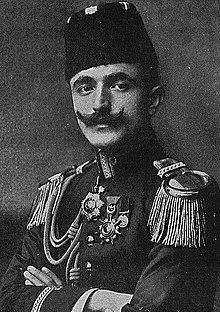This article needs additional citations for verification. (September 2024) |
| Enver Pasha's Rebellion | ||||||||||
|---|---|---|---|---|---|---|---|---|---|---|
| Part of the Basmachi Movement | ||||||||||
 Enver Pasha, leader of the rebellion | ||||||||||
| ||||||||||
| Belligerents | ||||||||||
|
|
| |||||||||
|
|
|
| ||||||||
| Commanders and leaders | ||||||||||
|
|
|
| ||||||||
| Casualties and losses | ||||||||||
|
|
| |||||||||
Enver Pasha's Rebellion (Uzbek: Enver poshoning qo'zg'oloni) refers to an armed uprising that was a part of the much larger Basmachi Revolt.[1] It was conducted by the former Ottoman Minister of War, Enver Pasha.
The uprising started in the summer of 1921 when Enver Pasha arrived in Bukhara to negotiate with the Basmachi. He ended up defecting to the Basmachi and began fighting the Bolsheviks. During this period of the Basmachi movement, they reached their peak, but by May 1922, with the start of Bolshevik counteroffensives in Turkestan, the Basmachi began to fall apart. By mid-June, Ibrahim Bek revolted against Enver, sparking a civil conflict that divided the Basmachi. The rebellion was ultimately crushed by August 4, 1922, when Enver Pasha himself was killed.
- ^ "БАСМАЧЕСКОЕ ДВИЖЕНИЕ | Энциклопедия Кругосвет". www.krugosvet.ru (in Russian). Retrieved 2024-08-02.